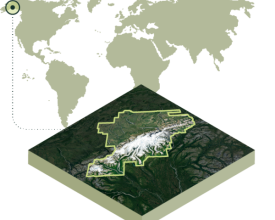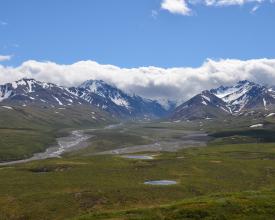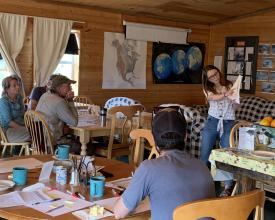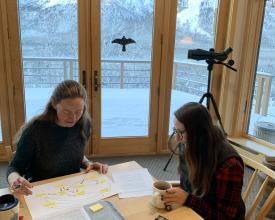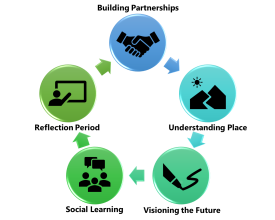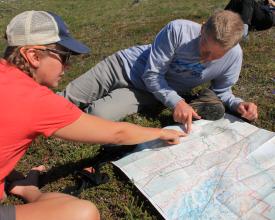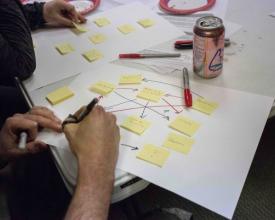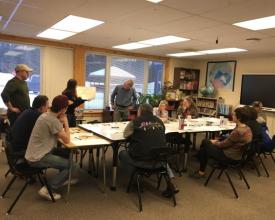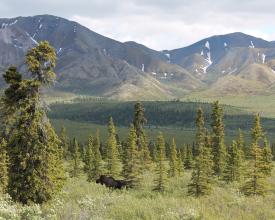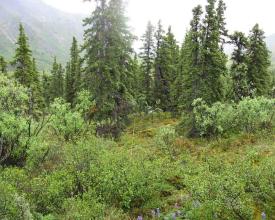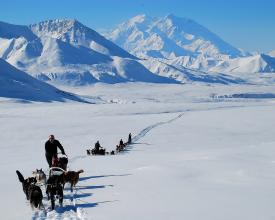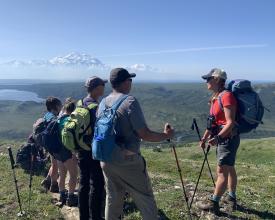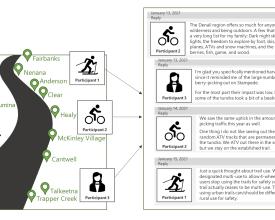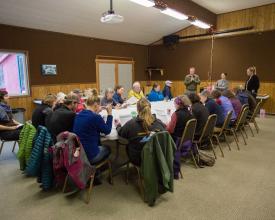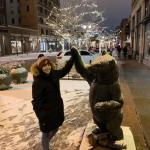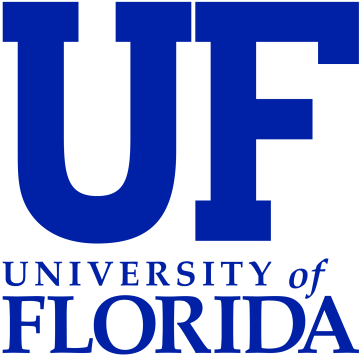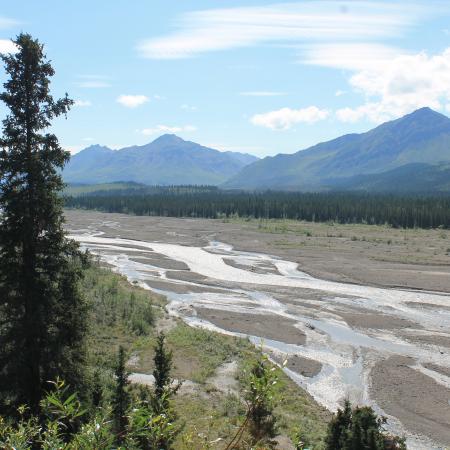
Inclusive Conservation through Social Learning in Alaska Protected Areas
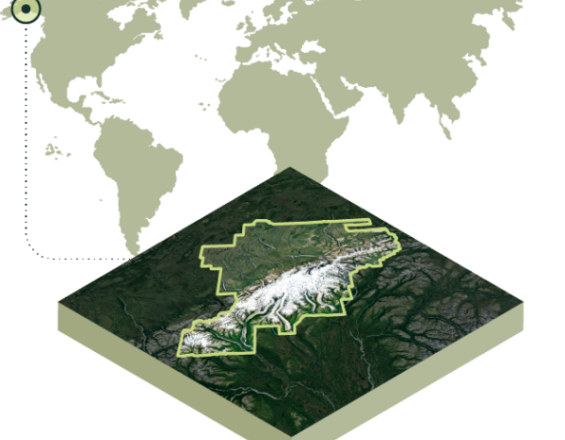
The Denali region of Interior Alaska faces social and environmental pressures related to rapid landscape change. Although the communities there are tight-knit and linked by their shared connection to the area, local stakeholders can feel excluded from regional decision-making to address resource management issues. One potential pathway toward more inclusive decision-making is having residents learn from and adapt to one another in discussions about landscape change, thereby strengthening underrepresented voices through collective knowledge building. Community deliberation can be challenging to get started, but social learning is a conservation tool that can facilitate shared dialogue based on understanding the many and diverse values related to public land management through community deliberation. This solution is based on the concept of socially inclusive conservation, which aims to represent how people value nature to improve protected area management.
Context
Challenges addressed
Our solution is aimed at addressing the interconnected environmental, social, and economic challenges in the Denali region. Some of the challenges include shifting weather and climate regimes due to climate change, the increasing risk of wildfire due to Spruce Beetle (Dendroctonus rufipennis), and concerns about how to best preserve of unique features of Denali landscape—such as the solitude, soundscape, and the expansive, rugged terrain—for future generations. Tensions and a lack of communication often exist between select stakeholder groups. As a result, some residents have expressed frustration over the lack of meaningful representation of different voices in public decision-making. Industrial tourism is one of the major economic challenges, because it brings jobs and the opportunity to sustain livelihoods in a rural landscape, while also focusing development on supporting visitors rather than preserving features of the landscape valued by residents who live in the area.
Location
Process
Summary of the process
The solution highlights the importance of building relationships and collective understandings over time to support inclusive decision-making about protected area management. The building blocks from the Denali region of Interior Alaska represent an iterative process, where each step has built off the last. The means and end goals for the project revolve around facilitating community deliberation about protected area management and identifying points of (mis)alignment in the diverse array of stakeholder perspectives. However, integrating these different understandings from stakeholders back into collective knowledge for conservation of the Denali region and beyond then becomes a new baseline, from which to develop future partnerships and capacity building.
Building Blocks
Building local partnerships
People who live in the Denali region are connected by their shared appreciation for the landscape, resulting in tight-knit communities. For the project to succeed, it was important that the research team establish a mutual understanding and trust based on local partnerships. These relationships have helped to ground the project in a relevant and regional context, provide insight into what matters most to local residents, and guide various phases of the project:
- A local Executive Committee consisting of ten stakeholders who represent a diversity of perspectives from the region was formed to build local partnerships.
- The project hired a local resident to be a research technician and community advocate for the project to assist with data collection, entry, project design, information dissemination, and communicating research findings.
- A series of informal interviews and listening sessions were conducted to start the process of creating a shared understanding of change within the Denali region.
Enabling factors
Demonstrated time and commitment from project representatives were critical for establishing partnership building as an active process. Additionally, team leaders already had conducted previous research in the area and formed several relationships that demonstrated their ties to the area, as well as long-term investments in facilitating discussions about landscape change.
Lesson learned
The importance of ongoing time, attention, and support that goes into building and maintaining partnerships cannot be overstated. The relationships that were initially built at the onset of the project require continual nurturing and cannot be viewed as a "checkmark" to move on from. Building partnerships also means being sensitive and responsive to locals’ ‘seasons’ in the year, for example, not asking to meet too often when it is a busy hunting or harvesting time of the year, even if this does not correspond to the busy times in the academic or management year. Additionally, efforts to build trust with different communities should likewise be approached with varying strategies. For example, something as simple as buying a cup of coffee at a locally owned business demonstrates reciprocity and investment into the well-being of the community.
Understanding the place
To deepen understandings of distinct perspectives in the Denali region, this project focused on engaging various stakeholders in discussions about the characteristics of the region and how it is managed. We used semi-structured interviews and focus groups. Interviews with residents included questions about participants’ sense of place, perceptions of landscape change, local organizations, knowledge of the landscape, and governance. Participants were identified during the first phase of this study and a snowball sampling approach was adopted whereby participants were asked to nominate others.
This phase also identified residents’ perceptions of the region as a social-ecological system to understand how communities are anticipating change and lay groundwork for collaborative management that prioritizes social-ecological resilience. This project adopted fuzzy cognitive mapping, which is a participatory tool used to graphically represent residents’ mental image of where they live and how things are connected to one another. This approach allowed residents to map their perceptions of the key features that characterized the region and drivers of change. The individual exercise was administered during a series of focus groups and interviews, resulting in 51 maps that were aggregated to represent a regional perspective.
Enabling factors
The main enabling factor was previous work based on building relationships, trust, and local partnerships. Prior to data collection, residents were asked to participate in informal meetings as a basis for introductions and discussion about the project. Residents who engaged in informal conversations were asked to participate in formal data collection. Initial conversations eased residents into the project and fostered trust with researchers. Residents had not previously participated in mapping exercises and appreciated heavy-handed facilitation.
Lesson learned
Engaging residents in semi-structured interviews and fuzzy cognitive mapping exercises resulted in an in-depth understanding of the diverse stakeholders’ histories, knowledge, perceptions, and connections to place that could be modeled to anticipate desired visions for the future. This phase of the research process was instrumental for continuing to build relationships with local stakeholders–sharing and opening discussion around the community maps with the local executive committee and the Denali communities–and inform the design of subsequent quantitative phases of data collection. Further, fuzzy cognitive mapping exercises generated an understanding of the Denali region as a social-ecological system as defined by residents. To better interpret findings from fuzzy cognitive maps, collecting and analyzing qualitative data from the focus groups or interviews is recommended. These results can elucidate synergies and gaps in how different stakeholder groups understand the region which is useful for developing communication strategies and participatory approaches for engaging residents in future planning for the region.
Visioning for the future of the Denali region
The purpose of visioning for the future of the Denali region is to evaluate stakeholder preferences and trade-offs they are willing to make when thinking about the future of the region. Identifying distinct visions for the future is important in places like Interior Alaska where impacts from climate change are magnified and anticipated to rapidly transform the social-ecological landscape. This information can inform decision-makers about priorities for the future across a gamut of stakeholders and serve as a foundation for participatory planning. This study evaluated visions as part of a mixed mode household survey administered to residents across the Denali region.
To identify preferences and trade-offs for future conditions, a discrete choice experiment that evaluated the strengths of preferences and trade-offs for future conditions of the Denali region was included. Survey data were used to understand preferences for attributes including wildlife populations, off-season tourism, and fire management, as well as the cost of maintaining current conditions of these attributes. Results showed that all of these factors influenced preferences for the future, and that the range of environmental attitudes held by stakeholder groups accounted for variation in the strength of preferences reported by survey respondents.
Enabling factors
Previous work that qualitatively evaluated residents’ perceptions of landscape change and knowledge were instrumental in the success of this building block. In particular, an in-depth understanding of relevant landscape features was built prior to developing the parameters in our discrete choice experiment. The collection of pilot testing data was also important to refine the language used in our survey and range of changes that were considered realistic future conditions in the region.
Lesson learned
Evaluating residents’ preferences for future landscape conditions and trade-offs they are willing to make when thinking about the future yielded important insights about residents’ priorities. This is crucial information for decision-makers to more effectively meet the needs of their constituencies. The development of this building block also taught lessons about the value of creative, mixed-mode strategies for data collection that would increase the likelihood of diverse perspectives being reflected in the final sample. Overall, working with local stakeholders to understand visions for the future was useful for generating empirical evidence that showed the relative importance of features that describe the Denali landscape. Results are also useful for anticipating resident support or resistance to changes in visions for the future in ways that can help decision-makers understand distinct stakeholders' viewpoints.
Learning through community deliberation
The purpose of community deliberation is to facilitate the process of social learning for residents about protected area management through stakeholder-driven discussions. Social learning is the change in understanding that occurs amongst individuals and groups through social interactions. A number of participatory approaches can be taken to facilitate social learning; we used community deliberation through an online discussion forum. The online discussion forum encompassed a four-week activity that residents participated in asynchronously. Residents were given a new topic prompt to address weekly and were encouraged to focus on responding to comments left by fellow residents. Weekly summaries were generated and feedback was also elicited to ensure the summaries accurately reflected residents’ deliberations. Over 400 responses and comments were posted by 37 residents on the discussion board throughout the four-week period. The last prompt asked residents what they had learned from participating in the forum, followed by a survey questionnaire administered online to measure other shifts in values, perceptions, or behaviors as a result of participation.
Enabling factors
Previous work based on relationship building in the area was important for participation, especially the listening sessions and establishing local partnerships. Residents were compensated for their time, positioned as experts who were asked to demonstrate their local knowledge, and organized into three smaller discussion groups to encourage personalized interactions. Additionally, the research team asked for feedback on the interpretation of findings to increase ownership of the project.
Lesson learned
Local residents enjoyed engaging in the online discussion and most appreciated collectively learning more about the landscape and protected area management. The positive attitude of the research team supported the learning process by building an appreciative dialogue of places in the Denali region. Maintaining flexibility in the research approach was also important to support participation for a broader array of residents within a rural landscape. For example, some people chose to engage anonymously to mitigate risk, while others shared their name and appreciated that they knew some of the people in their groups. Focus groups were held at the beginning of the forum to provide personalized guidance on the purpose of the forum to get things started, followed by the asynchronous discussion. Some of the participants expressed interest in having repeated meetings in addition to the online discussion component. Overall, we suggest that a mixture of online, in-person, and hybrid engagement strategies work best to capture the range of preferences for participation.
Resources
Reflection period and integrating outcomes
The purpose of the reflection period and integration of project outcomes is to continually disseminate findings from this research to residents, businesses, government agencies, scientists, and other relevant decision-makers who are shaping the future of protected areas, those in the Denali region. In turn, the research team is building knowledge of how residents are discussing and reacting to pressures related to rapid social, economic, and landscape change, and this knowledge is being reported back to stakeholders. This cyclical process of co-creation is occurring throughout the project. The medium for reflection is taking a variety of forms, particularly through webinars, in-depth discussions with the local executive committee, and reports provided to decision-makers. The reflection period will culminate in a film about communities in the Denali region, as well as wrap-up workshops at the end of the project. These workshops are being framed as spaces for civic discovery whereby residents become aware of the diverse values for places that they do (and do not) share with others in the region. They are encouraged to recognize potential opportunities for growth in ways that take advantage of shared thought, directed actions and channeled support for preserving the desired character of places.
Enabling factors
All previous phases of this project are instrumental in supporting this building block. The mixed-methods databases from this project provide the empirical basis for engaging and reflecting on lessons learned from the research process. Existing relationships across an array of stakeholders is also important for encouraging participation and maximizing impacts that emerge from the study.
Lesson learned
Major lessons learned throughout the project include: (1) Trust building is an ever-present set of actions that needs continual attention. (2) There is a shift towards replacing the dichotomy of use versus preservation, by the complexity of environmental sustainability, industrial tourism, and landscape change. (3) Charting a course for inclusive conservation will require understanding processes that reduce tensions across stakeholder groups. (4) Moving away from generalized conflict, to clarify specific points of conflict and appreciate points of agreement.
Impacts
The solution has connected community members and local stakeholders from various interest groups across the Denali region. Building local partnerships helps to identify the needs of people living in the area and research directions that are the most meaningful for residents. Understanding residents’ connections with the Denali landscape is the second critical step in the solution, which results in building trust and shared understanding with a tight-knit community wary of newcomers or temporary residents who do not intimately love or understand the region like they do. Activities, such as a survey about visioning the future of the region highlight key trade-offs that people make to adapt to landscape change, the importance of multiple values to predict engagement in stewardship activities, and the role of trust in shaping residents’ perceptions of inclusivity. Social learning through community deliberation also results in residents gaining knowledge about diverse perspectives and building valuable relationships to increase community capacity for engaging in regional decision-making. The interconnected outcomes from the building blocks are being continually reintegrated into the collective understanding of the Denali region through webinars, workshops, and meetings with government and industry leaders.
Beneficiaries
The project aims to increase engagement within and between residents, businesses, government agencies, and other decision-makers who are shaping the future of the region. The scientific community is also a key target audience for this research.
Sustainable Development Goals
Story

Solutions are a journey. The ENVISION project has involved residents sharing their connections with local environments and opening up about the challenges surrounding resource management across diverse interest groups. We initiated this project to understand the perspectives of local residents around Denali National Park and Preserve and Denali State Park in Alaska, but had not fully appreciated the difficulties of in-depth conversations about topics that were central to people’s identities and heritage, as well as steeped in the lived experiences of a contentious history. In our first focus group, we visited the Native Village of Cantwell to learn about the notoriously mixed relationships residents had with management agencies of nearby lands. Our presence was met with resistance among those who had felt previously betrayed by public participation events. These residents spent more than two hours sharing their frustrations about what appeared to them to be more disingenuous outreach; concerns were shared that not all voices had been heard in the past and that land use policies often failed to represent all people, including Native Alaskans. After this event, we dedicated the following weeks to building relationships with these individuals and discussing their concerns. By the end of our visit, attendees felt comfortable enough to speak openly with us about their values, with the hope that our project would provide a pathway for them to communicate more directly with decision-makers. This experience helped us to appreciate the complexities of deep-seated historical relationships between people and places, and the need for an open dialogue to understand how residents respond to agencies that manage public lands in Alaska. Over the next two years, our research process involving listening sessions, surveys and planning workshops has been open to these honest (albeit difficult) appraisals of conflict around landscape change given their power to build a constructive conversation grounded in appreciation and respect for others. The ENVISION project continues to work toward greater understanding and enhanced communication about diverse interests and how they are (or are not) represented in environmental policies. The continual set of actions adopted through our research thus provide a guide for all stakeholders – including residents, scientists and resource management agencies – for their journey of co-creating inclusive conservation solutions in the Denali region of Alaska, US.

